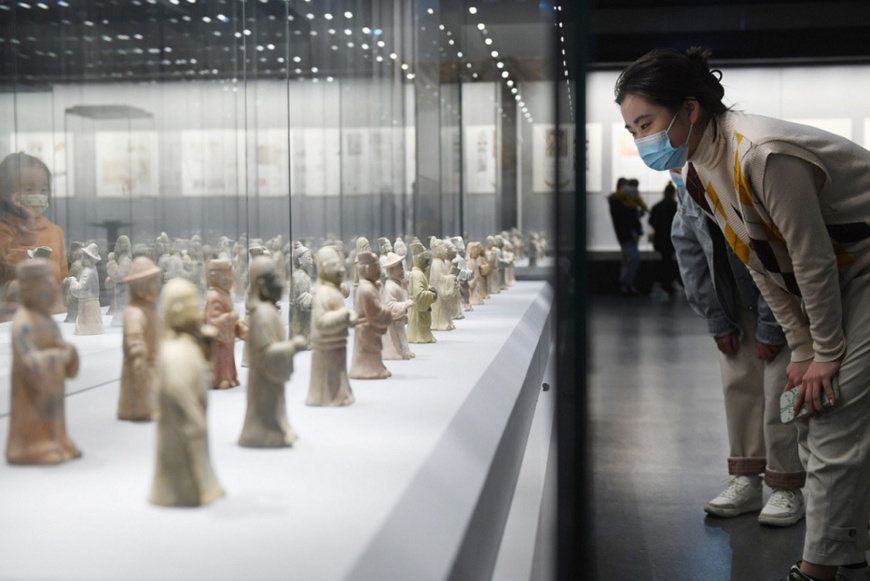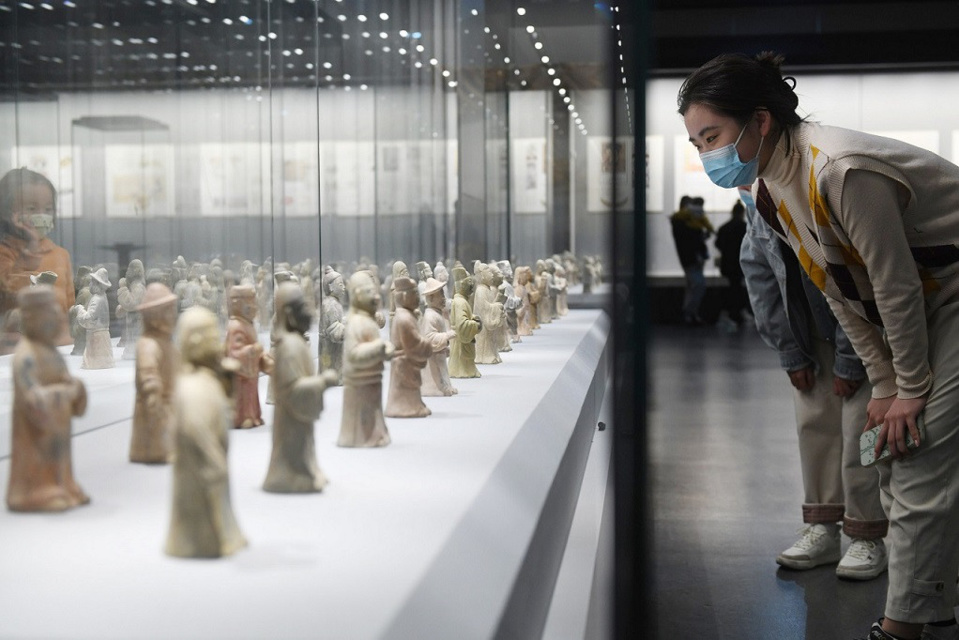By Wang Jue, People's Daily

A woman watches cultural relics displayed at an exhibition of Ming Dynasty (1368-1644) treasures held at Fuyang, east China's Anhui province, November, 2022. (Photo by Wang Biao/People's Daily Online)
A modern museum system that involves diverse entities specialized in a wide range of fields and is accessible to all has taken shape in China, as the country continuously pushes forward with the reform of heritage museums and sees a significant rise in the influence of these institutions.
It is a new trend for Chinese people nowadays to visit museums. China is one of the countries with the largest number of museums in the world. Last year, 395 new museums were registered in the country, bringing the total number to 6,183. About 91 percent of all museums in China open free to the public.
The numbers of museums, the exhibitions they held, and the visitors they received in 2021 surged by 60 percent, 144 percent, and 119 percent, respectively, from those in 2012.
China's museums are specialized in a wide range of fields and hold various activities. Last year, they hosted a total of 36,000 exhibitions and 323,000 educational activities, and received 779 million visits.
Besides, they also launched free tour guide services, cultural lectures, antique authentication services, exhibitions of cultural relics repairing skills, and other splendid activities, to attract more people.
Today, 77 percent of all districts and counties in China have built museums, and the digital information of more than 5 million pieces or sets of collections is shared with the public.
A museum that manufactures and displays traditional Chinese brush pens for better inheritance of the traditional craft and cultural exchanges in Yinping township, Zaozhuang, east China's Shandong province, has signed agreements with universities, middle schools and primary schools to launch regular cultural activities, as well as Chinese painting and calligraphy exhibitions.
In southeast China's Fujian province, there is a wood carving museum that displays hundreds of traditional Chinese wood sculptures. Liu Yu, a student visiting the museum from Guangxi University in south China's Guangxi Zhuang autonomous region, told People's Daily that the wood sculptures and the stories behind them present the charm of this intangible cultural heritage and the profound tradition of the Chinese culture.
Heritage museums shall always be made a public utility accessible to the people, said Gu Yucai, deputy director of the National Cultural Heritage Administration (NCHA). In this regard, major comprehensive museums shall play a leading role and the medium and small ones shall meet people's basic demand for culture, he noted.
The country should encourage the establishment of industry museums and guide the development of private museums, Gu added.
Last year, museums across China launched over 3,000 online exhibitions and 10,000 online educational activities, receiving a total of 4.1 billion views.
They have employed new technologies to develop cultural and creative products, innovate the ways of communication and promote wise utilization of cultural relics, in an attempt to make collections more alive.
In recent years, a number of TV shows about cultural relics and archaeology have become sensational, helping educate the public on the history and China's fine traditional culture..
An NCHA official noted that the country will take multiple measures and fully leverage its research outcomes to diversify cultural supply, thus further enriching the cultural lives of the people.
It is a new trend for Chinese people nowadays to visit museums. China is one of the countries with the largest number of museums in the world. Last year, 395 new museums were registered in the country, bringing the total number to 6,183. About 91 percent of all museums in China open free to the public.
The numbers of museums, the exhibitions they held, and the visitors they received in 2021 surged by 60 percent, 144 percent, and 119 percent, respectively, from those in 2012.
China's museums are specialized in a wide range of fields and hold various activities. Last year, they hosted a total of 36,000 exhibitions and 323,000 educational activities, and received 779 million visits.
Besides, they also launched free tour guide services, cultural lectures, antique authentication services, exhibitions of cultural relics repairing skills, and other splendid activities, to attract more people.
Today, 77 percent of all districts and counties in China have built museums, and the digital information of more than 5 million pieces or sets of collections is shared with the public.
A museum that manufactures and displays traditional Chinese brush pens for better inheritance of the traditional craft and cultural exchanges in Yinping township, Zaozhuang, east China's Shandong province, has signed agreements with universities, middle schools and primary schools to launch regular cultural activities, as well as Chinese painting and calligraphy exhibitions.
In southeast China's Fujian province, there is a wood carving museum that displays hundreds of traditional Chinese wood sculptures. Liu Yu, a student visiting the museum from Guangxi University in south China's Guangxi Zhuang autonomous region, told People's Daily that the wood sculptures and the stories behind them present the charm of this intangible cultural heritage and the profound tradition of the Chinese culture.
Heritage museums shall always be made a public utility accessible to the people, said Gu Yucai, deputy director of the National Cultural Heritage Administration (NCHA). In this regard, major comprehensive museums shall play a leading role and the medium and small ones shall meet people's basic demand for culture, he noted.
The country should encourage the establishment of industry museums and guide the development of private museums, Gu added.
Last year, museums across China launched over 3,000 online exhibitions and 10,000 online educational activities, receiving a total of 4.1 billion views.
They have employed new technologies to develop cultural and creative products, innovate the ways of communication and promote wise utilization of cultural relics, in an attempt to make collections more alive.
In recent years, a number of TV shows about cultural relics and archaeology have become sensational, helping educate the public on the history and China's fine traditional culture..
An NCHA official noted that the country will take multiple measures and fully leverage its research outcomes to diversify cultural supply, thus further enriching the cultural lives of the people.
 Menu
Menu
 Modern museum system takes shape in China
Modern museum system takes shape in China
















